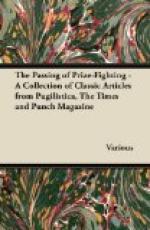Egyptian revels often boast a guest
In sparkling robes and blooming chaplets
drest;
But, oh! what loathsomeness is hid beneath—
A fleshless, mould’ring effigy of
death;
A thing to check the smile and wake the
sigh,
With thoughts that living excellence can
die.
How many at the coming feast will see
THE SKELETON OF HONOURED WORTH IN THEE!
* * * * *
SUPREME: COURT OF THE LORD HIGH INQUISITOR PUNCH.
“Laselato ogni speranza, voi ch’ intrate!”
JOHN BULL v. THE PEEL PLACE-HUNTING COMPANY.
MR. JOBTICKLER said he had to move in this cause for an injunction to restrain the Peel Place-hunting Company from entering into possession of the estates of plaintiff. It appeared from the affidavits on which he moved, that the defendants, though not in actual possession, laid an equitable claim to the fee simple of the large estates rightfully belonging to the plaintiff, over which they were about to exercise sovereign dominion. They had entered into private treaty with the blind old man who held the post of chief law-grubber of the Exchequer, offering him a bribe to pretend illness, and take half his present pay, in order to fasten one of the young and long-lived leeches—one Sir Frederick Smal-luck—to the vacant bench. They were about to compel a decentish sort of man, who did the business of Chancery as well as such business can be done under the present system, to retire upon half allowance, in order to make room for one Sir William Fullhat, who had no objection to L14,000 a year and a peerage. They were about to fill two sub-chancellorships, which they would not on any account allow the company in the present actual possession of the estates to fill up with a couple of their own shareholders; and were, in fine, proceeding to dispose of, by open sale, and by private contract, the freehold, leasehold, and funded property of plaintiff, to the incalculable danger of the estate, and to the disregard of decency and justice. What rendered this assumption and exercise of power the more intolerable, was, that the persons the most unfit were selected; and as if, it would appear, from a “hateful love of contraries,” the man learned in law being sent to preside over the business of equity, of which he knew nothing, and the man learned in equity being entrusted with the direction of law of which he knew worse than nothing; being obliged to unlearn all he had previously learnt, before he began to learn his new craft.
LORD HIGH INQUISITOR.—Don’t you know, sir, that poeta nascitur non fit? Is not a judge a judge the moment he applies himself to the seat of justice?
MR. JOBTICKLER.—Most undoubtedly it is so, my lord, as your lordship is a glorious example, but—
LORD HIGH INQUISITOR.—But me no buts, sir. I’ll have no allusions made to my person. What way are the cases on the point you would press on the court?




